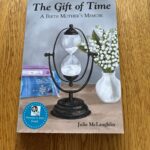 Not long ago I read an article in the Wall Street Journal that debunked everything we’ve all believed about what is nutritious and what is not for the past 30 or 40 years. I was appalled. This was scientific certainty. Everyone agreed on it. There had been scientific studies. How could I now be reading an article that said exactly the opposite from what we’ve all assumed to be right for all this time?
Not long ago I read an article in the Wall Street Journal that debunked everything we’ve all believed about what is nutritious and what is not for the past 30 or 40 years. I was appalled. This was scientific certainty. Everyone agreed on it. There had been scientific studies. How could I now be reading an article that said exactly the opposite from what we’ve all assumed to be right for all this time?
At breakfast, I reasserted my confusion. “I don’t know what to use in my cooking now,” I said to my husband. “I don’t know what is healthy and what is not. They’ve always said . . . .”
“Who is they?” he said. “They say this. They say that. But then it all changes.” “They change.” Even who we consider to be experts – that changes too. “
I said, “Yes, I guess there’s only one thing that we can always count on as being true: God’s Word in the Bible. It doesn’t change.”
As I thought about his comment and my response, I realized how that applied to all of life. It’s so easy for us to rely on common beliefs, the current thinking about something, scientific findings, and “what they say . . . .”
But there is only one thing we can always count on as being true, and that is God and His Word. When we see one kind of truth coming from the world and another truth coming from God’s Word, which one should we believe?
Even the evidence in archaeological findings triumphs over doubters and attests to the truth of God’s Word. In the early 20th century, critics mistrusted the Bible’s historical reliability, regarding much of the Bible as myth. But little by little, archaeologists began to discover cities and artifacts that proved the existence of previously disputed biblical accounts and locations. The Hittite Empire, referenced 40 times in the Bible, was generally considered a myth by critics until 1906 when Hugo Winckler uncovered 10,000 clay tablets that documented the lost Hittite Empire. With each new revelation, critics were forced to seriously reevaluate their criticism of the Bible’s historical reliability.
Whether it is about morality, how to live life, who God is, history, or even science, the Bible trumps the world’s wisdom. The world with its changing theories, beliefs, histories, morals, and philosophies cannot be depended on. If we build our life on those alone, we may come to a point when we look back and see that we have built our life on sand and much of our life has been fruitless. But if we build our life on the rock of God’s truth, everything we build upon that rock will stand, and when we enter the kingdom of God one day, we will hear, “Well done, good and faithful servant.”
As for everyone who comes to me and hears my words and puts them into practice, I will show you what they are like. 48 They are like a man building a house, who dug down deep and laid the foundation on rock. When a flood came, the torrent struck that house but could not shake it, because it was well built. 49 But the one who hears my words and does not put them into practice is like a man who built a house on the ground without a foundation. The moment the torrent struck that house, it collapsed and its destruction was complete” (Luke 6:47-49).
Anytime we are tempted to start relying on the world’s experts to guide us through life, we can add a little levity to our perspective by watching the video below to remind ourselves of the unreliability of “they.” Sometimes we just need to laugh at ourselves and what we rely on as truth.





Speak Your Mind